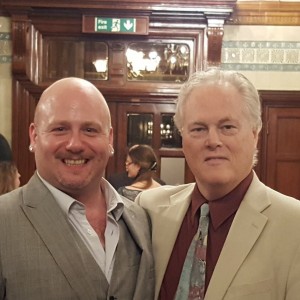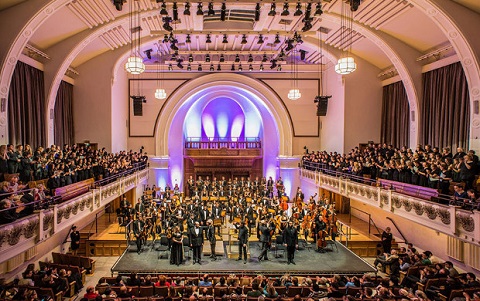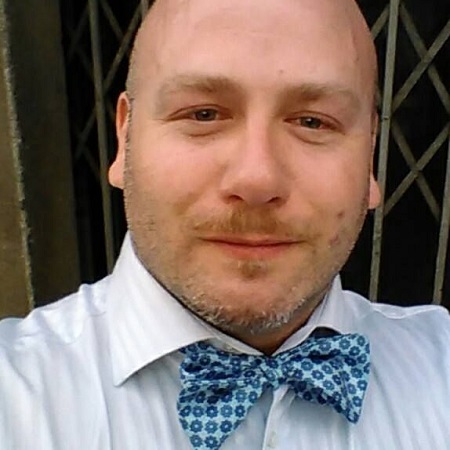A specialist bel canto tenor, teacher, managing director of the
London
Bel Canto Festival Academy
and the
Festival’s Artistic Director
, Ken evidently has an enormous passion for the bel canto
repertoire, style and traditions - and a commitment to upholding and
developing such traditions, particularly among young singers either
studying at or recently graduated from music conservatoires in London and
beyond.
He ‘defines’ bel canto in an embracing and inclusive manner. A
glance at Grove reminds me that while the term is sometimes
applied exclusively to Italian opera of the time of Rossini, Bellini and
Donizetti, it remains ambiguous: ‘German musicology in the early 20th
century devised its own historical application for “bel canto”, using the
term to refer to the simple lyricism that came to the fore in Venetian
opera and the Roman cantata during the 1630s and 40s (the era of Cesti,
Carissimi and Luigi Rossi) as a reaction against the earlier,
text-dominated stilo rappresentativo’. Bel canto is often
used nostalgically to denote a lost tradition, particularly in the context
of the ‘battle’ between the speech-inflected, ‘weighty’ style associated
with late-19th century German opera, and Wagner in particular,
and the earlier Italian art of ‘beautiful singing’. Rossini, in 1858, is
reported to have lamented the decline of this art, in 1858 - ‘Alas for us,
we have lost our bel canto’ - and it’s been a battle-cry in the
vocabulary of Italian singing teachers such as Luigi Ricci (1893-1981).
While, as Ken clarifies, we associate the bel canto style with
long melodic lines sung in an even tone, with expressive nuance, a
lightening of the voice in the higher registers, and flexible
ornamentation, such features should not be seen as relevant to only a
‘narrow’ repertoire of early-19th century Italian compositions,
although this period might be seen as a ‘high’ bel canto epoch. He
sees the development of vocal style during the years up until the 1850s as
being more seamless and organic - interestingly, Grove notes that
the term did not acquire a specialised meaning until the mid-19 th century - and bel canto technique as being as
applicable to the works of Mozart as to Bellini et al. Indeed,
while Wagner might have decried Italian singing for its preoccupation with
‘whether that G or A♭ will come out roundly’, proposing instead a German
school which would draw ‘the spiritually energetic and profoundly
passionate into the orbit of its matchless Expression’, in his early
writings he had urged German composers to look towards Italian models,
writing in an 1837 article entitled, simply, ‘Bellini’, that the vocal
melodies of this ‘gentle Sicilian’, had ‘of late excited so much attention,
and kindled so much enthusiasm, even in Germany, the land of the learned …
Melody is in short the language in which a man should impart his musical
thoughts to others.’
 Ken Querns-Langley and Bruce Ford at the 2017 London Bel Canto Festival.
Ken Querns-Langley and Bruce Ford at the 2017 London Bel Canto Festival.
That said, Ken describes to me research by one of his fellow scholars at
the Royal College of Music, Barbara Gentili, which focuses on the impact of verismo on the late-19th century Italian vocal
tradition. Gentili identifies a ‘shift’ in the later years of that century
which Ken summarises, drawing parallels with visual art, as the difference
between ‘representation’ and ‘realism’: bel canto singing is the
embodiment of an emotion, verismo singing is that
emotion. Naturally, further ‘shifts’ have occurred during the 20 th and 21st centuries, and it’s necessary and
advantageous to go back to the past and to understand and reconnect with
former styles and techniques.
So, perhaps for Ken bel canto is essentially an aesthetic which
comprises repertoire, voice production, technique, style and vocal identity? Ken agrees, commenting on the training that young
singers receive in today’s academies and colleges, where the emphasis has
shifted from a focus on purely technical studies to the need to develop
knowledge of repertoire and to perform regularly on the stage, with the
result that young singers often have a notion of how their voice ‘should’
sound without really understanding or appreciating how it ‘does’ or ‘could’
sound. He recounts an experience teaching a talented young singer who had
previously developed a vocal cord cyst, and who believed that she would
need a procedure which Ken recognises as a normally recommended course of
action. After a several lessons developing features of bel canto
technique the singer had added a fourth to the top of her range, from C’’
to F’’, and found that she was able to sing with a light and even pianissimo. Doctors subsequently examining her vocal cords found
that the cyst had diminished and that surgical treatment was no longer
considered necessary and refused to perform: indeed, it would probably do
more damage than good. The singer had discovered that the sound that she
had believed she ‘should’ make, was not in fact her true vocal ‘identity’;
and, Ken explains that a young singer’s misunderstanding of their own vocal
identity can lead to both psychological and physiological pressure and
distress.
He describes to me his own vocal studies with lyrico spinto dramatico
soprano, Georgyn Geetlein, from the Metropolitan Opera, who extended his
upper range and taught him how to bridge his passagio; and,
subsequently, during a two-year sojourn in Italy, with Sherman Lowe, a much
sought-out vocal teacher based in Venice, now living in Trieste. Such
studies supplemented an instinctive love for bel canto repertoire
with a sense of a responsibility to uphold and develop its traditions.
But, why establish a bel canto vocal school and festival in London? Ken’s residency in London originated in a serendipitous
visit to the capital in the late 1980s, en route for Paris where
he intended to study: arriving at Paddington station and venturing out in
search of a taxi, he suddenly felt, for the first time, a sense of being
‘at home’. Though further studies, travel and work in Italy, Spain and
elsewhere followed, the hankering to return to London did not lessen.
Postgraduate studies at King’s College London enabled him to move to the
capital, and he continued his voice lessons, training with teachers and
coaches from Covent Garden, the National Opera Studio and English National
Opera. Now, London really is ‘home’, though he also teaches in Copenhagen,
and internationally via Skype.
The third Bel Canto Festival will enable almost twenty young singers to
spend two or three weeks following
opera performance and vocal development programmes
comprising daily private lessons and coaching, performance-focused language
repertoire coaching, performance workshops, and masterclasses with
Bruce Ford
,
Nelly Miricioiu
, Ken himself and others. There are
public masterclasses and concert performances
, but singers are encouraged to focus on the development of their technique
and vocal identity, and to avoid becoming too concerned with the actual
performance of particular arias being studied for that purpose.
 2018 London Bel Canto Festival Gala Concert at Cadogan Hall © Harbor Hill.
2018 London Bel Canto Festival Gala Concert at Cadogan Hall © Harbor Hill.
In addition, the 2018 Festival saw the establishment of a
‘composer-in-residence’ for the first time, in order to develop new works
which enable singers ‘to express the fullest of bel canto vocal principles
in modern settings’ and which, as Ken explains have been developed with a
view to enabling singers to explore their own vocal ‘sound’ and expression
rather than their voice simply serving as a vehicle for a composer’s
personal expression. The Festival will conclude with two performances of
Bellini’s little-known opera,
Beatrice di Tenda
, in St George’s Church, Hanover Square, staged in concert with a chamber
orchestra, on 22nd and 24th August. It’s hoped, too,
that collaborations with other institutions such as Opera Rara will be
developed in future years.
Ken is equally interested in bel canto practice and
scholarship, and is currently completing doctoral
research on the voce faringea
- the high tenor voice and roles which are normally beyond the vocal
compass of modern tenors, one of the best-known examples of which is
Arturo’s arioso ‘Credeasi misera’ from Bellini’s I Puritani which
reaches up to F5 - at the
Royal College of Music London
. His study of countless historical treatises and documents relating to
performance reception, alongside quantitative analysis of particular arias
with respect to the frequency of particular pitches, dynamics and other
features in arias which we know were composed for specific singers, has
resulted in findings which, while inevitably cannot propose ‘absolutes’
about the nature of the high tenor sound, have uncovered mis-translations
and mis-interpretations in extant scholarship - in particular with respect
to the similarity or otherwise between the high tenor sound and those
associated with falsetto, the countertenor and the female voice - that have
made it possible for Ken to consider how we might ‘re-construct’ this
sound, and to create a teaching manual in order to do so.
During our meeting the conversation ranges far and wide, from
psycho-acoustics to the ‘science’ of vowel production at different pitches;
from pedagogy to performance psychology, to the history of the King’s
Theatre Haymarket. Ken concludes by reminding me that Britain, and
specifically London, is in many ways at the heart of the bel canto tradition. Many esteemed singers and teachers of
yesteryear passed through or spent considerable time in the capital: for
almost 50 years, for example, Manuel Garcia - the brother (and singing
teacher) of Maria Malibran - taught at the Royal Academy of Music in
Marylebone, and of his greatest students Mathilde Marchesi also lived and
taught here in London.
It’s probably one step too far to suggest that ‘bel canto is
coming home’! But, it will certainly be thriving and developing in London
this summer.
The
London Bel Canto Festival
runs from 5th to 24th August.
Claire Seymour


